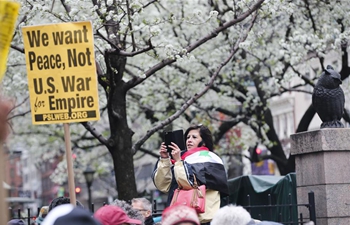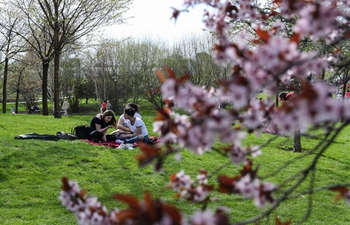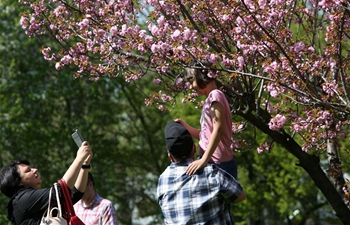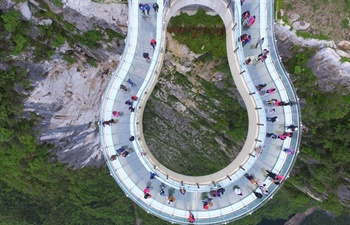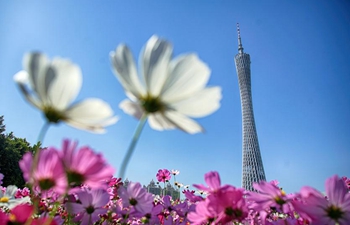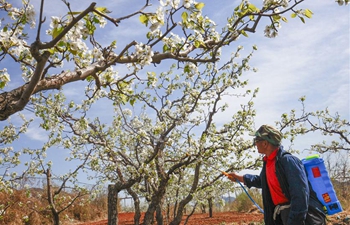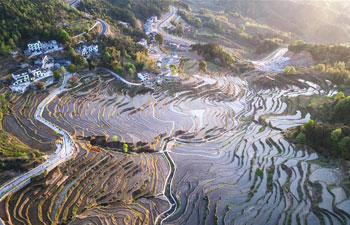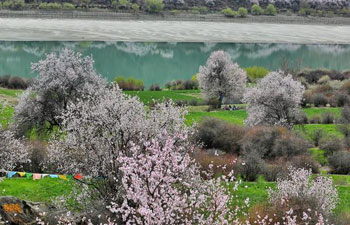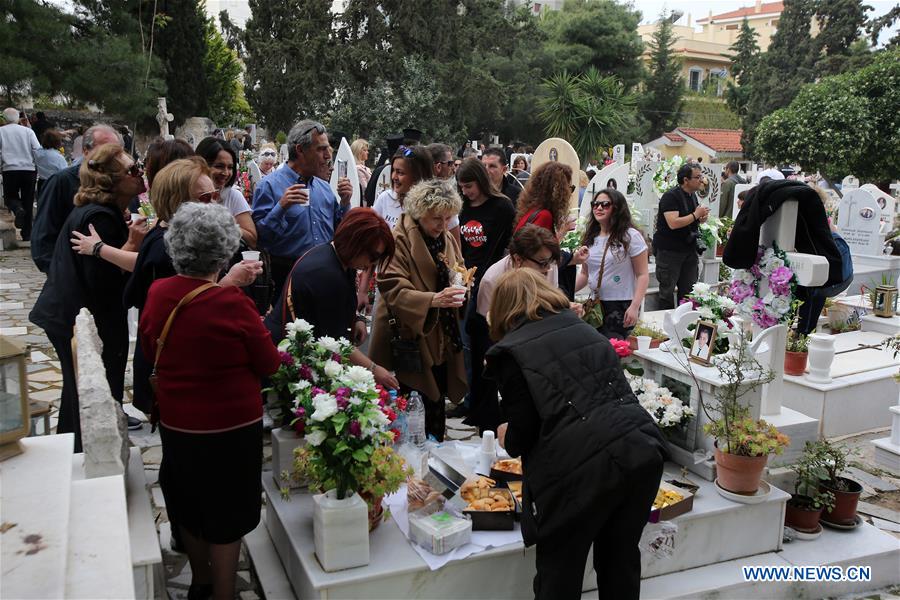
Greeks gather at a cemetery to honor their deceased loved ones in Athens, Greece, on April 15, 2018. Cemeteries worldwide are linked to pain of loss and tears of sorrow. For thousands of Pontian Greeks, an ethically group who lived for centuries on the shores of the Black Sea and has now dispersed across the world, once a year, the burial sites of their deceased loved ones are transformed into a place of joy. The first Sunday after Greek Orthodox Christian Easter families gather at cemeteries, set the table on the marble graves, eat delicacies, drink wine, ouzo and vodka, narrate stories about their dead, play music with traditional instruments, sing and dance. (Xinhua/Marios Lolos)
ATHENS, April 15 (Xinhua) -- Cemeteries worldwide are linked to pain of loss and tears of sorrow. For thousands of Pontian Greeks, an ethically group who lived for centuries on the shores of the Black Sea and has now dispersed across the world, once a year, the burial sites of their deceased loved ones are transformed into a place of joy.
The first Sunday after Greek Orthodox Christian Easter families gather at cemeteries, set the table on the marble graves, eat delicacies, drink wine, ouzo and vodka, narrate stories about their dead, play music with traditional instruments, sing and dance.
The roots of the odd tradition which may seem macabre to non Pontians go back to ancient Greece, according to scholars. From antiquity the offering of tasty food to the deceased was a way to honor their memory.
This group of Greek Christian Orthodox worshippers, who celebrate the Resurrection of Jesus Christ on Easter and believe in after life, enriched the ancient custom and passed it on from generation to generation.
Pontians kept alive the tradition even when they were forced to leave their homes during wars in the early 20th century.
One of the points of reference for Pontians in Greece and abroad is the cemetery of Sourmena, a district in the municipality of Elliniko- Argyroupoli, in southern Athens.
Since 1923 refugees from Turkey who set up their tents, and gradually built their new homes and lives in this part of the Greek capital- and today their descendants- one Sunday every year flood the Sourmena cemetery to remember their deceased, celebrate life and come to terms with death.
In recent years about 120,000 people reach the cemetery of Sourmena the first Sunday after Easter, Yorgos Sarafidis, President of the local cultural club of Pontians, told Xinhua on Sunday, as the celebration was underway.
They do not all have relatives buried here, but visit Sourmena to meet with other Pontians and experience the custom. A Pontian travelled from Thailand this year to join in the feast, Sarafidis noted.
They do not flock here to mourn, but pay respect to their ancestors and celebrate their lives and their cultural heritage, he explained.
"As long as one remembers the deceased of his/ her family's genealogical tree, the memory of these dead people remains alive... This is a day of joy, not for sad memories," Sarafidis explained.
Thodoros Baliaktaris was one of the persons at Sourmena cemetery on Sunday. He came with his children and grandchildren to honor the memory of his parents and his brother who have passed away.
The family originated from Sourmena in modern Turkey. The district took its name after the homeland they left behind.
"Ancient Greeks used to lay foods on the graves of their beloved to honor their relatives. This is exactly what we are doing here today," he told Xinhua.
"We feel as if our beloved ones are still here, with us. We do not forget them and we think that they keep an eye on us, as long as they can, from wherever they are... It is a very nice custom," he said.
Katerina Konstantinidi, a 23-year-old archaeologist, was also among the odd party-goers.
"I come here since I was a baby, when they were holding me in their arms. It is a family tradition. We come here, we cook, we eat, we celebrate. It is a day of celebration, not mourning. Today we enjoy life," she told Xinhua.
"When I first tell my friends about this custom they are shocked, because they have linked cemeteries with sadness and crying and so on. How can you go there and eat and have fun inside a cemetery, they ask me. But whoever has come along they way here and lived the experience with us, has understood that things are different," she explained.
Eleni Vrinioti is not of Pontian origin, but has been married to a Pontian and learned everything about the tradition from her mother-in-law.
"This is a string link for Pontians who live here, but also abroad and come to visit on this special day. It is also a way for the community to get accustomed to the idea of death," she said.




